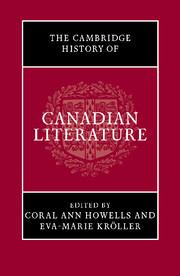Book contents
- Frontmatter
- Introduction
- PART ONE OLD AND NEW WORLD, LA NOUVELLE-FRANCE, THE CANADAS, DOMINION OF CANADA
- PART TWO THE POST-CONFEDERATION PERIOD
- 7 Post-Confederation poetry
- 8 Writing by Victorian naturalists
- 9 Short fiction
- 10 Bestselling authors, magazines, and the international market
- 11 Textual and social experiment in women’s genres
- 12 Canada and the Great War
- PART THREE MODELS OF MODERNITY, POST-FIRST WORLD WAR
- PART FOUR AESTHETIC EXPERIMENTS, 1960 AND AFTER
- PART FIVE WRITING IN FRENCH
- Bibliography
- Index
- References
12 - Canada and the Great War
from PART TWO - THE POST-CONFEDERATION PERIOD
Published online by Cambridge University Press: 28 September 2010
- Frontmatter
- Introduction
- PART ONE OLD AND NEW WORLD, LA NOUVELLE-FRANCE, THE CANADAS, DOMINION OF CANADA
- PART TWO THE POST-CONFEDERATION PERIOD
- 7 Post-Confederation poetry
- 8 Writing by Victorian naturalists
- 9 Short fiction
- 10 Bestselling authors, magazines, and the international market
- 11 Textual and social experiment in women’s genres
- 12 Canada and the Great War
- PART THREE MODELS OF MODERNITY, POST-FIRST WORLD WAR
- PART FOUR AESTHETIC EXPERIMENTS, 1960 AND AFTER
- PART FIVE WRITING IN FRENCH
- Bibliography
- Index
- References
Summary
We have come to view the First World War as a pointless bloodbath, a “monstrous and futile Valley of Death.” Yet during the war years and indeed for decades after, many Canadians thought otherwise. In September 1914, two Methodist clergymen, Samuel Chown and A. Carman, described the good that had already come from the “crushing evil” of the war: “There has been such a manifestation of the patriotism of our people as to enkindle our souls to ardor and admiration. We are aroused to emulate heroic sacrifices and valiant deeds. We come all of us to feel we have a country, a land we call our own, and to unite in its protection and service. In these seven-fold hotter fires, our varied elements are fused to beauty and to strength.” After just a month of war, the hottest fires were yet to come – the Second Battle of Ypres, Vimy Ridge, Passchendaele – but already, in Chown and Carman’s prescient address, Canada’s war was taking on a mythic dimension as a nation-forging crucible. The victory at Vimy Ridge in 1917 – when the four Canadian divisions, composed of men from across the country, advanced over a height of land that neither British nor French troops had been able to take – is still identified as “the key to making Canada a nation.”
- Type
- Chapter
- Information
- The Cambridge History of Canadian Literature , pp. 224 - 244Publisher: Cambridge University PressPrint publication year: 2009
References
- 1
- Cited by



